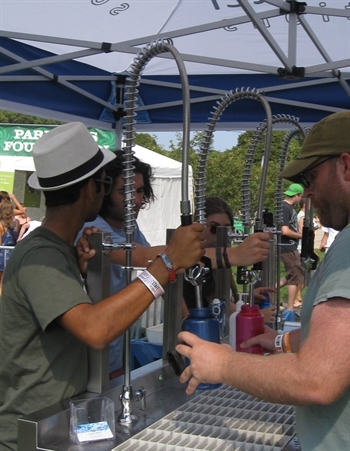In September, MPC and Openlands will launch What Our Water's Worth, a multi-year campaign exploring the many ways in which we use, manage and value water. The initial goal is to raise awareness about the need to invest in, protect and conserve our invaluable water resources, ultimately leading to policy change. An interactive web site will feature information on how to protect our water supplies, and a monthly e-newsletter will capture the unique water experiences — think a meter reader, a beer brewer, or a paddler — of real people throughout northeastern Illinois and northwestern Indiana. This story, about conservation strategies at Lollapalooza, offers a peek at what's to come.
Most people think of Lollapalooza as that behemoth music festival in early August that attracts droves of young, hip music fans to Chicago’s Grant Park for three raucous days – and it certainly is that. Yet, like many major festivals, including the World Cup and our own Taste of Chicago, Lollapalooza 2010 took steps to balance its bacchanalian spirit by going green – and blue.
The height of summer is prime time for dehydration, so Lollapalooza organizers encouraged festival-goers and staff to drink plenty of water – but promoted conservation at the same time. All food vendors were required to bring their own water, an incentive to waste less and reduce overall usage. To cut down on single-use plastic bottles, Lollapalooza staff sipped theirs from custom-designed SIGG bottles, and organizers encouraged fest-goers to bring or purchase their own refillable containers and rehydrate at water stations.
Those who didn’t BYOB (bring their own bottles) could purchase water at the festival, but even that vendor – h2o – was carefully selected. “We have a new water supplier sourced from [pristine, sustainable natural underground aquifers in the Canadian Niagara Escarpment] that uses a recyclable paper carton made from sustainable forests,” said Green Street Production Manager Emily Stengel. Festival garbage was sorted at additional cost in order to recycle as many of the h2o bottles as possible. Through the Rock & Recycle Rewards Program, festival-goers received a free Lollapalooza T-shirt as a reward for each bag they filled with bottles, cans and other recyclable materials – including the h2o cartons – from the fair grounds. In 2009, more than 3,000 people participated.
Anyone who has tried to refill water bottles at large festivals knows that the free-for-all at the water fountains leads to broken faucets, swaths of mud, and lots of wasted water. This year’s festival organizers contracted with Event Water Solutions to bring in 10 refilling stations, with doting attendants who ensured no drop hit the ground.

Refilling stations at Lollapalooza are specifically designed to reduce waster waste.
Katie Roche
“I’ve never seen that before; it’s a lot more efficient this way,” said Katie Roche, a thirsty concert-goer waiting in line to refill a Nalgene bottle she’d brought from home. “And it’s nice that I don’t have to stand around in the muck just to get a drink.”
Lollapalooza is hot, sweaty and loud, but at the same time, it's also an attempt at mass environmental stewardship and consciousness raising. With some foresight and inititaive, all the hundreds of festivals and fairs that make this region such a great place to live can be the same.
Research assistant Max Settle-Winick contributed to this story.
What Our Water's Worth will launch in September, and is sponsored by Illinois American Water. We welcome additional sponsors. If you are interested in sponsoring the campaign, signing up for the e-newsletter, or anything else, please contact Josh Ellis at jellis@metroplanning.org or 312.863.6045.